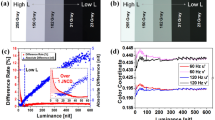Abstract
The average life spans of light-emitting diodes (LEDs) used in organic light-emitting diode displays are negatively influenced by high current operation in short duty cycles. Since the time average brightness of a pixel LED is a function only of the time integral of the delivered current, it is desirable to achieve brightness by adopting pixel addressing schemes that employ long duty cycles. Conventional addressing methods which cannot operate more than one row of pixels at a time inherently have very short duty cycles. We solve the problem by proposing entire frame addressing, made possible by a new image factorization called monotonic-nonnegative matrix factorization (M-NNMF). Using M-NNMF, we develop a converging image series representation of an arbitrary nonnegative matrix (image). Each element of the series has unit rank, which allows it to drive an entire frame simultaneously. Each application of the M-NNMF algorithm produces a dominant unit rank component for the series, and a residue image of higher rank, the input to the next iteration. We drive the display with these unit rank components, called sub-frames, each for a duration proportional to its energy. The sum of sub-frames approximates the original image and provides the same visual effect, due to inherent perceptual integration. M-NNMF, more efficient and less time complex compared to existing NNMF algorithms, is our primary contribution in this paper and is likely to find applications in many other situations. We also obtain an even faster converging series with a randomized version of M-NNMF. The proposed approach of entire frame image display is demonstrated on a wide variety of images.




















Similar content being viewed by others
References
Berry, M.W., Browne, M., Langville, A.N., Pauca, V.P., Plemmons, R.J.: Algorithms and applications for approximate nonnegative matrix factorization. Comput Stat Data Anal 52(1), 155–173 (2007)
Cichocki, A., Zdunek, R., Amari, S.I.: Hierarchical ALS algorithms for nonnegative matrix and 3D tensor factorization. In: Independent Component Analysis and Signal Separation, Springer, Berlin, pp 169–176 (2007)
Eisenbrand, F., Karrenbauer, A., Skutella, M., Xu, C.: Multiline addressing by network flow. Algorithmica 53(4), 583–596 (2009a)
Eisenbrand, F., Karrenbauer, A., Xu, C.: Algorithms for longer OLED lifetime. J. Exp. Algorithmics (JEA) 14, 3 (2009b)
Fyfe, D.: Total Matrix Addressing for OLED Displays. In: FPD Conference, La Jolla, CA (2007)
Gillis, N., Glineur, F.: Accelerated multiplicative updates and hierarchical ALS algorithms for nonnegative matrix factorization. Neural Comput. 24(4), 1085–1105 (2012)
Gillis, N., Glineur, F.: A multilevel approach for nonnegative matrix factorization. J. Comput. Appl. Math. 236(7), 1708–1723 (2012)
Gonzalez, E.F., Zhang, Y.: Accelerating the Lee-Seung algorithm for non-negative matrix factorization. Department of Computational and Applied Mathematics, Rice University, Houston, TX, Technical Report TR-05-02 (2005)
Lee, D.D., Seung, H.S.: Learning the parts of objects by non-negative matrix factorization. Nature 401(6755), 788–791 (1999)
Lee, D.D., Seung, H.S.: Algorithms for non-negative matrix factorization. In: Advances in Neural Information Processing Systems, pp. 556–562 (2000)
Lin, C.J.: Projected gradient methods for nonnegative matrix factorization. Neural Comput. 19(10), 2756–2779 (2007)
Smith, E., Lawrence, N.: Multi-line addressing methods and apparatus. US Patent 8,237,638 (2012)
Smith, E., Routley, P., Foden, C.: Method of driving a display using non-negative matrix factorization to determine a pair of matrices for representing features of pixel data in an image data matrix and determining weights of said features such that a product of the matrices approximates the image data matrix. US Patent 7,953,682 (2011)
Smith, E., Mash, P., Cable, A.: Image processing systems. US Patent 8,405,581 (2013)
Smith, E.C.: Total Matrix Addressing (\(\text{TMA}^{{\rm TM}}\)). In: SID Symposium Digest of Technical Papers, vol. 38, pp. 93–96. Wiley Online Library (2007)
Xu, C., Karrenbauer, A., Soh, K.M., Wahl, J.: A New Addressing Scheme for PM OLED display. In: SID Symposium Digest of Technical Papers, vol. 38, pp. 97–100. Wiley Online Library (2007)
Author information
Authors and Affiliations
Corresponding author
Rights and permissions
About this article
Cite this article
Soniwal, Y., Mitra, A. & Venkatesh, K.S. Entire frame image display employing monotonic convergent nonnegative matrix factorization. J Real-Time Image Proc 16, 2189–2211 (2019). https://doi.org/10.1007/s11554-017-0730-3
Received:
Accepted:
Published:
Issue Date:
DOI: https://doi.org/10.1007/s11554-017-0730-3




